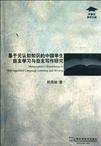基于元认知知识的中国学生自主学习与自主写作研究
出版时间:2012-7 出版社:上海外语教育出版社 作者:阮周林 页数:354 字数:349000
内容概要
阮周林所著的《基于元认知知识的中国学生自主学习与自主写作研究》以认知心理学研究中的元认知知识体系为理论框架,以中国外语学习者为研究对象,通过自主写作教学探究实践和多途径的研究观察,详尽分析和研究了学生自主语言学习和自主写作能力发展相关的各种学习观念与知识。《基于元认知知识的中国学生自主学习与自主写作研究》提出了可解释外语自主学习和自主写作的元认知知识交互作用的理论模式以及基于过程写作法的自主写作课程教学原则,在元认知理论应用、教学行动研究设计以及定性数据分析处理等方面均可以为国内外语教学研究和实践提供重要的参考资料。
书籍目录
Chapter 1 Introduction
1.1 Introduction
1.2 The Chinese ELT context
1.3 Aims and significance of the study
1.4 0rganisation of the thesis
Chapter 2 Literature Review
2.1 Introduction
2.2 Autonomy in language learning
2.3 Metacognition
2.4 Research on writing and writing itruction
2.5 Summary of the literature review
Chapter 3 Research Design
3.1 Introduction
3.2 Research approaches to language leaming in dassrooms
3.3 Itrument design
3.4 Pedagogical design of the writing coue
3.5 Data collection
3.6 Data analysis
3.7 Summary
Chapter 4 Knowledge and Beliefs about Self-regulated Language
Learning
4.1 Introduction
4.2 Descriptive results of the questionnaire survey
4.3 Relatiohips between the subcategories of the peonvariable
4.4 Attributional facto in learning success
4.5 Inter-group differences in peon, task and strategic
variables
4.6 Summary of the chapter
Chapter 5 Peon Knowledge
5.1 Introduction
5.2 Pre-coue peon knowledge about writing
5.3 Post-coue peon knowledge about writing
5.4 Key themes of pre- and post-coue peon knowledge
5.5 Developing trend of peon knowledge: triangulation of the
diaries
5.6 Participants' questionnaire results of the peon variable in
language learning
5.7 Summary of the chapter
Chapter 6 Task Knowledge and Strategic Knowledge
6.1 Introduction
6.2 Pre-coue task knowledge about writing
6.3 Post-coue task knowledge about writing
6.4 Key themes of pre- and post-coue task knowledge
6.5 Developing trend of task knowledge: triangulation of the
diaries
6.6 Pre-coue strategic knowledge
6.7 Post-coue strategic knowledge
6.8 Key themes of pre- and post-coue strategic knowledge
6.9 Developing trend of strategic knowledge: triangulation of
the diaries
6.10 Participants' questionnaire results of task and strategic
variables in language learning
6.11 Effects of the writing coue on participants' writing
performance
6.12 Summary of the chapter
Chapter 7 Case Studies
7.1 Introduction
7.2 Xue
7.3 Cheng
7.4 Zhang
7.5 Fang
7.6 Summary of the chapter
Chapter 8 Overall Discussion and Conclusio
8.1 Introduction
8.2 Revisiting the research goals
8.3 Summary of the research findings and discussion
8.4 The issue of sustainability
8.5 Theoretical model of metacognitive knowledge in language
learning
8.6 Pedagogical principles of self-regulation in L2 writing
8.7 Evaluation of the research
8.8 Final conclusio and recommendatio for future research
Bibliography
Appendices
章节摘录
Questionnaires are also a popular research tool for studying larningstrategies of L2 learners and self-regulation. The following studies are ofparticular relevance to the questionnaire design ofthe present study.Oxford(1990) designed a survey instrument called "Strategies in Language Learning"(SILL), which has a wide currency in the investigation oflanguage learners'learning strategies, particularly about the use ofcognitive and metacognitivestrategies. Rubin and Thompson (1994) developed a questionnairespecifically concerned with language learners' executive control over theirlearning. The function of executive control mainly includes the use ofmetacognitive or self-regulated strategies, such as planning, monitoring, and evaluation. Wen and Johnson (1997) combined the survey techniques within-depth interviewing to establish the impact ofa number oflearner variableson Chinese tertiary level students' achievement on a language course. Thestudy found that self-management strategies, such as planning, evaluation,and affective control, had an important part to play in separating successful and unsuccessful language learners. These studies have shown that the questionnaire instrument isan effective, efficient research tool for identifying patterns oflanguagelearners' knowledge and beliefs about language learning, and theirstrategy use. Moreover, the questionnaire data can provide usefulinformation about the relationship between learner beliefs and othervariables oflanguage learning, such as self-regulation/autonomy, learningachievements, and learners' cultural backgrounds. The adoption ofthe questionnaire instrument in this study has been informed by theseprevious studies. ……
编辑推荐
《外教社博学文库:基于元认知知识的中国学生自主学习与自主写作研究》基于在英国雷丁大学2002年9月至2005年12月间完成的博士论文修改而成,研究主题为在中国外语教学环境下的学习者语言自主学习能力发展。自主学习通常界定为学习者的能力或意愿,涉及中国外语学习者的语言自主学习研究往往从跨文化的视角,把自主性阐释为西方教育传统的文化理念,以探讨在中国外语教学环境下的可适用性。本书则突破了这一文化范畴的局限,研究基于认知心理学领域中的元认知知识为理论框架,以元认知知识的三个构成要素,即主体知识、任务知识和策略知识,界定和分析了中国外语学习者的自主语言学习和二语写作的各种观念和知识,同时结合学生二语写作技能的培养,通过以自主写作能力为课程目标的写作教学行动研究,以历时观察的方法考察学生在学习过程中元认知知识结构的变化和自主学习与自主写作能力的发展。
图书封面
评论、评分、阅读与下载
基于元认知知识的中国学生自主学习与自主写作研究 PDF格式下载
用户评论 (总计0条)
推荐图书
- 孔子庙堂碑
- 物理-初中四星级题库-第5版-答案及难题详解
- 高中英语语法详解手册
- 高中五星级题库 物理 第5版
- 元崇業墓誌 夫人王氏墓誌 赫連子悦墓志
- 道因法師碑
- 五年中考试题透视(上海卷)
- SketchUp8.0建筑设计十日通
- 快乐理财的方法
- 中文版3ds max 2012+VRay+Photoshop室外效果图制作经典208例
- 黑客攻防实战必备
- 成本会计
- 看视频学显示器维修
- 数据库系统教程
- 网络管理原理及实用工具
- 基础医学概论
- 3ds Max高级角色建模
- 英语高分突破指南
- 计算机学科专业基础综合复习指南
- 证劵市场基础知识同步辅导教材
- 邹慕白字帖·同步描摹 英语达标 4年级上
- 邹慕白字帖·同步描摹 英语达标 7年级上
- 语文-教材解读-1-必修
- 20以内的进.退位加减法-学前5分钟口算题卡-5-保护视力版
- 泥马渡康王
相关图书
- 掺气设施与强迫掺气水流
- 英语
- 红色记忆-第一辑-7
- 大学生职业责任文化素质养成
- 红色记忆-第一辑-3
- 新编英语教程
- 新标准高职英语专业系列教材
- 流畅英语口语教程
- ロスト・グレイの静かな夜明け
- ジョジョリオン 3
- 单簧管指引手册
- 北海道自覽遊2007年版
- 當沖必勝聖經
- 火舞空行-移喜蹉嘉傳奇
- 圖解三國演義-圖解經典05
- 悲懷書簡-印刻文學218
- 豪華客船で恋は始まるCharacters Book
- 礼盒·0-3岁认知书·1岁书
- 乌伤英杰
- 西游记故事
- 大学俄语泛读教程-1-新版
- 建筑材料试验指导
- 峄山刻石
- 2008~2012五年高考试题透视历史(上海卷)
- 高中五星级题库 第5版 答案及难题详解 数学
